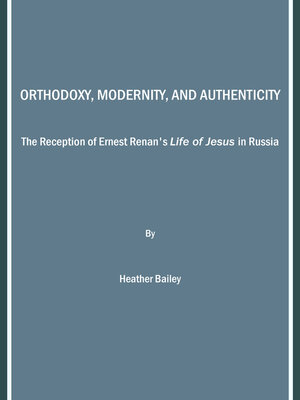Orthodoxy, Modernity, and Authenticity
ebook ∣ The Reception of Ernest Renan's "Life of Jesus" in Russia
By Heather Bailey

Sign up to save your library
With an OverDrive account, you can save your favorite libraries for at-a-glance information about availability. Find out more about OverDrive accounts.
Find this title in Libby, the library reading app by OverDrive.



Search for a digital library with this title
Title found at these libraries:
| Library Name | Distance |
|---|---|
| Loading... |
Ernest Renan was one of the most renowned European intellectuals of the second half of the nineteenth century. Yet, the impact of his most popular work, Life of Jesus, has been underestimated when not altogether ignored. While commonplace now, the idea that Jesus was merely human was at one time a novelty, with significant socio-political, cultural, and religious implications. A case study in the Russian encounter with modernity, Orthodoxy, Modernity, and Authenticity: The Reception of Ernest Renan's "Life of Jesus" in Russia demonstrates that Renan's book has had long-lasting and broad appeal in Russia because it presents an alternative to a strictly materialist worldview on the one hand, and an Orthodox worldview on the other. Renan offered his readers the possibility to accept the tenets of modernity while still retaining both an admiration for the importance of religion in history and a sense of religious feeling or even belief in a higher religious ideal. Assessments of Renan's alternative belief system, whether positive, negative, or mixed, were often simultaneously evaluations of the moral, socio-political, and spiritual condition of European society in general and Russian society in particular. The interpretive history of Renan's Life of Jesus in Russia reveals a persistent disillusionment with a strictly materialist interpretation of history and of life.







